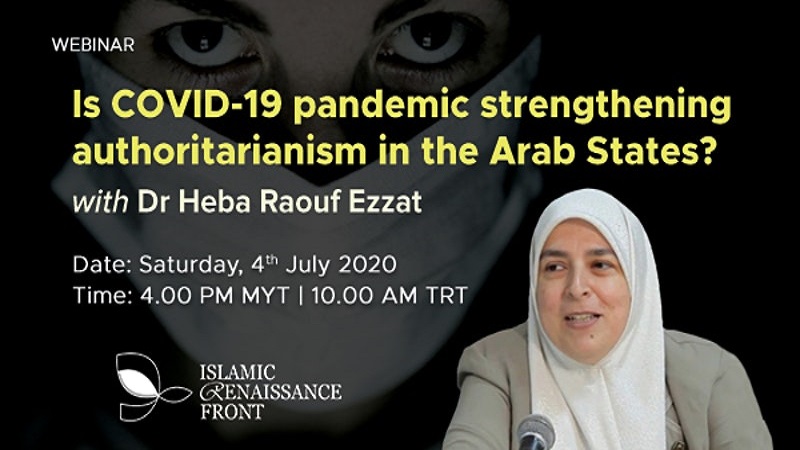Is COVID-19 Pandemic Strengthening Authoritarianism in the Arab States?
Date and time: Saturday, July 4, 2020, 3 to 5 pm Malaysia Time (UTC+8)
Register here.
Around the world, governments have taken great strides to tackle the crisis of COVID-19 pandemic. However, there have been worrying signs that this pandemic is increasing authoritarianism and weakening the rule of law in some countries. We have witnessed that when democratic institutions like the free press and independent judiciary were undermined, and the rights of the people to protest or to engage in monitoring the government is limited; corruption thrived. Somehow or rather, this pandemic has offered the corrupt and authoritarian leaders the power of distracting the people and reducing the oversight.
Take President Abdel Fattah El-Sisi for example, who had made a series of constitutional amendments which led the military to assume ultimate authority in the country, wiping out what little remained of democracy gained during the Arab Spring. He had used the pandemic as a pretext to amend emergency powers to further strengthening the military grip on power with the resulting abuse of human rights, curtailing freedom of speech and rights to protest. When independent media is silenced, he is able to promote self-serving propaganda rather than facts. It is not surprising then when tens of thousands of the Muslim Brotherhood members were detained without charges and locked-up in prisons under inhumane conditions.
Meanwhile many governments in the Middle East have upgraded their surveillance capabilities under the pretext of combating the virus pandemic. The states of the Gulf Cooperation Council (GCC) – Bahrain, Kuwait, Oman, Qatar, UAE and Saudi Arabia – have also upgraded their form of authoritarianism in the wake of the pandemic. They have exploited the virus threat to bolster their own survival strategy and to manage their population. Policies that undermine civil liberties were enacted to perpetuate their current political design that generated no protest from their population. This was done under the guise of forced quarantine to save lives. This pretext somehow helps to construct new ways of regime maintenance and security.
The fact remains that the Arab states were torn apart by this virus and it acts as an acid-test on how governments manage the crisis and their resilience. And the question remains whether these Arab states are enacting measures in ensuring information is not suppressed or manipulated, or natural resources are spent appropriately on ailing infrastructures even before the crisis starts, or deal with the spread of the virus adequately, or instead, preparing themselves for the backlash from their citizens later if they are not? This Webinar will look into these issues and will try to answer these questions among many others.
About the speaker:
Dr. Ezzat earned her BA (Honors), MA (Honors) and Ph.D. in political science from Cairo University where she was coordinator of the Civil Society Program for Research and Training and Foreign Relations, coordinator of the University’s Center for Political Research and Studies and foreign relations and academic events coordinator of the Program for Dialogue between Civilizations in the University’s Faculty of Economics and Political Science. Dr. Ezzat has been a visiting researcher at the Centre for Democracy of the University of Westminster in London and at Oxford’s Centre for Islamic Studies; a visiting fellow at UC Berkeley (2010) and Georgetown University (2012). Dr. Ezzat is widely published in both English and Arabic on subjects related to Islam, women and politics as well as on citizenship, global democracy, global civil society and Islamic epistemology. She authored a background paper on Gender Equality in the Arab World for the 2006 UN Development Programme’s Arab Human Development Report. Her recent (2015) publications in Arabic include two titles: “The Political Imagination of Islamists” and “Towards a New Civility.” Dr. Ezzat is currently assistant professor in political theory at Cairo University and the American University in Cairo, and a visiting fellow at London School of Economics (2015-2016).
Program:
- 3:00-3:15 PM: Introduction by the moderator, Ehsan Shahwahid
- 3:15-4:00 PM: Presentation by Dr. Ezzat
- 4:00-4:55 PM: Discussion
- 4:55-5:00 PM: Concluding remarks by the moderator, Ehsan Shahwahid


